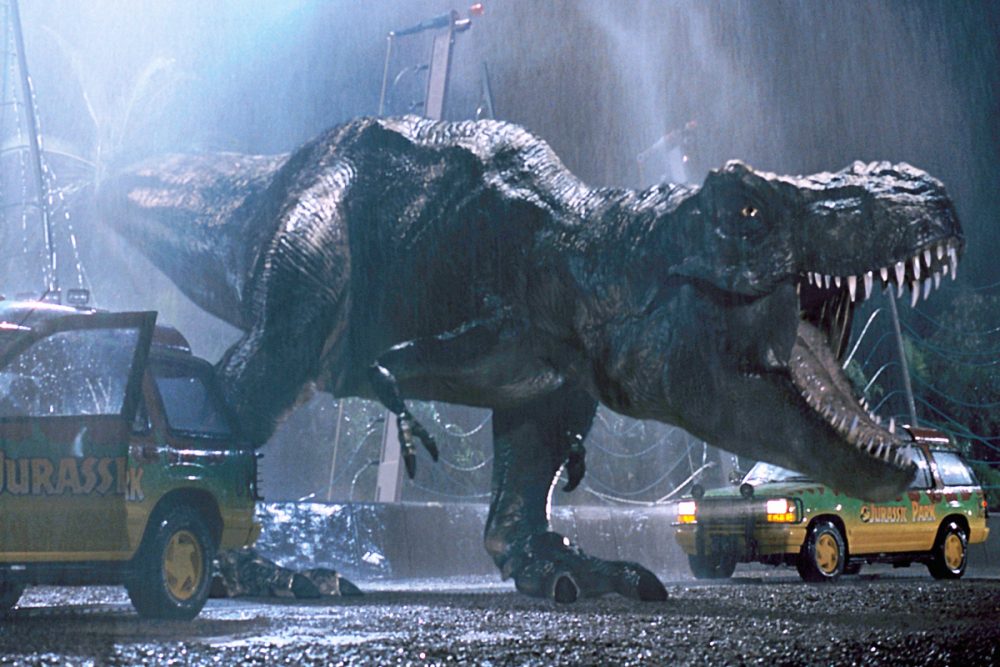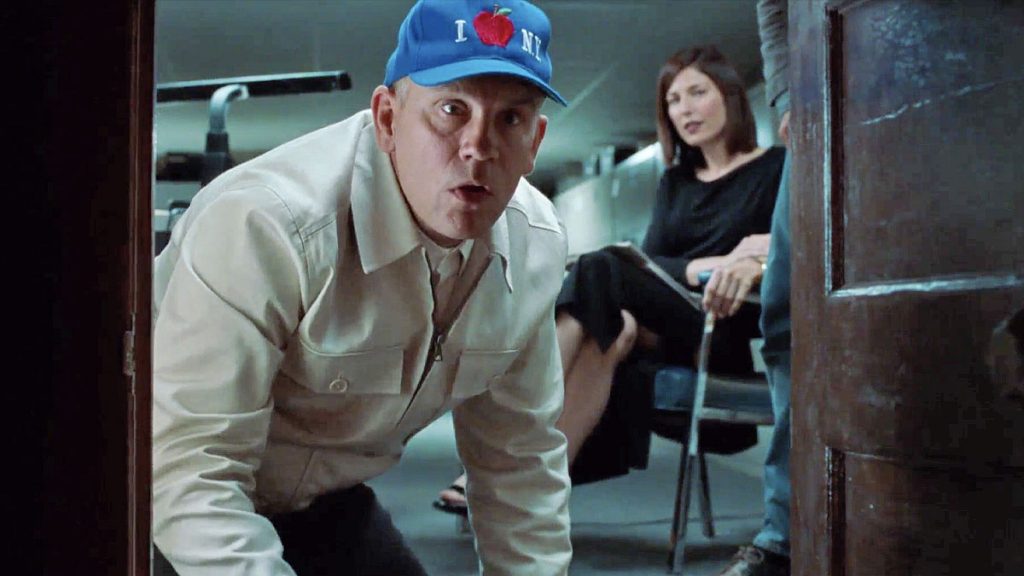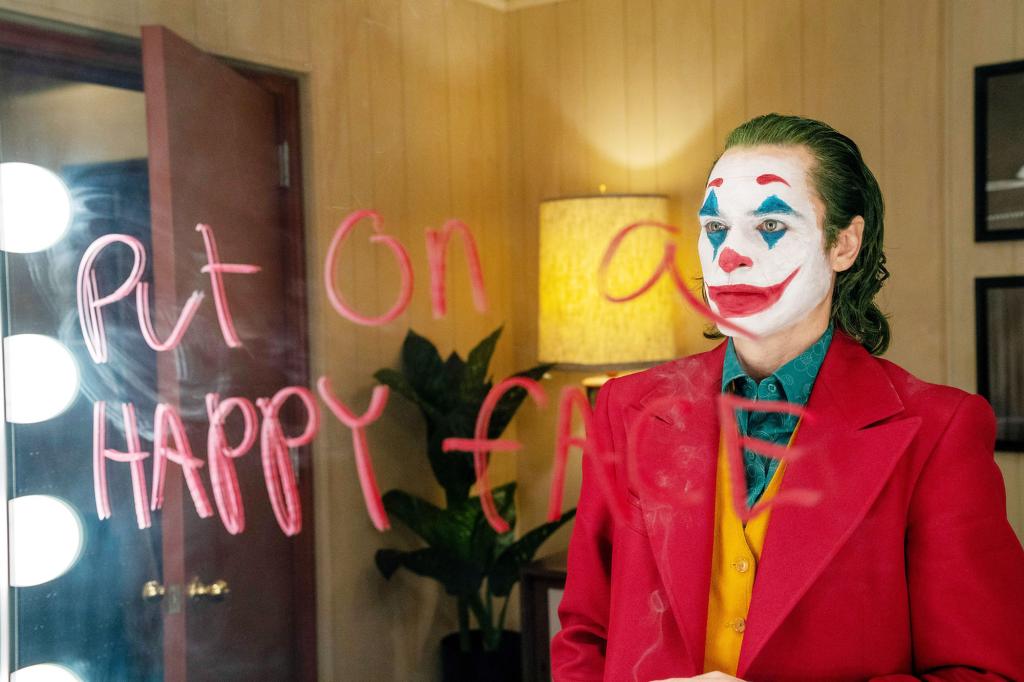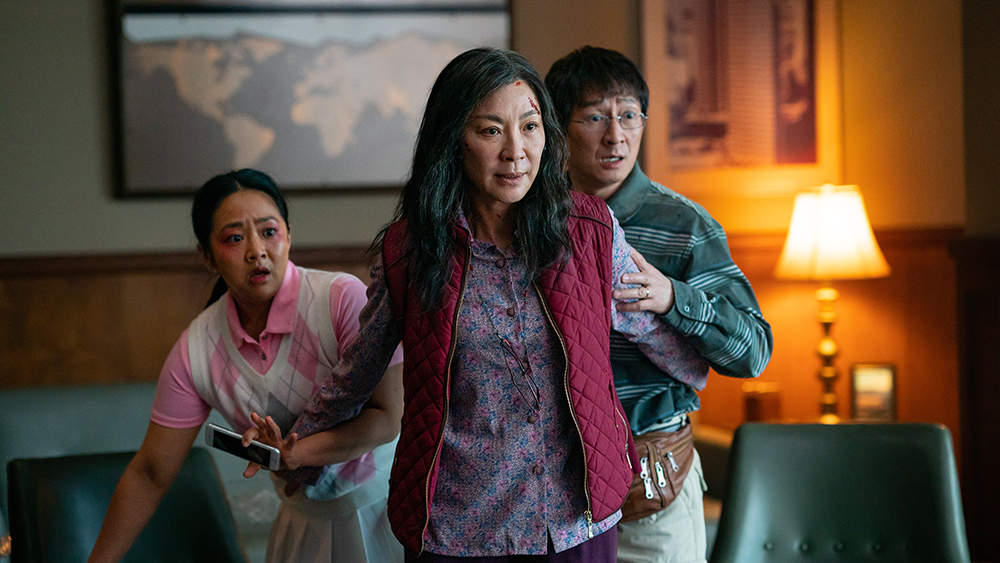
As a kid who grew up on Star Wars, and who loves the original Star Wars more than anything, you would think that A New Hope would be the most memorable movie from my childhood. But that actually isn’t true. Both Empire Strikes Back and Return of the Jedi were more memorable.
The reason for this is, Star Wars began a new expectation in Hollywood that, with each new blockbuster film, you were going to see things you had never seen before. And when I went to those sequels, that’s exactly what happened. I saw AT-AT walkers and tauntauns. I saw aliens with lobster heads and speeder bikes shooting through gigantic trees.
Back then, Star Wars was the defining franchise for Hollywood’s new mantra: GIVE THEM SOMETHING NEW AND FRESH. Every movie that had aspirations of being a hit had to give audiences something genuinely new. It’s why Jurassic Park did so well. It’s why Men in Black and Independence Day and The Matrix and Aliens did so well. Hollywood operated off of this idea that why would someone see a movie if all you were going to give them was something they’d already seen?

But somewhere around 2005, when comic book movies started to take over and special effects companies were able to create anything you could imagine, it all of a sudden became a lot more difficult to give audiences something new. Once you have a man in an iron suit fighting a giant green monster in the sky or five-story tall robots hurling each other into city buildings… what can you really show audiences at that point that they haven’t seen?
Marvel realized that this was going to be a problem. Whether intentional or not, they had opened up Pandora’s Box. How do we tempt audiences to come to theaters when we’ve already given them everything? They’ve come up with a temporary solution. More superheroes. You cram more spidermen, more Avengers, and more surprise guest caped crusaders into your flick, because, technically, you are still giving audiences something new. You’re giving them more superheroes to play around with.
And Marvel has a quasi stay of execution since they now own 20th Century Fox. People are going to be excited to see the X-Men hanging out with Thor. They’re going to be excited to see the Silver Surfer cutting a jib with Starlord. They’re going to love when the Fantastic Four goes on an adventure with Spidey. But eventually, even that will peter out. At a certain point, people are going to say, “What’s new? What’s next?”

I think about this a lot because you – as in you, reading this article right now – are the solution to this problem. It will be up to you to come up with the next big thing. The question is, is it possible to come up with the next big thing anymore? Is it possible to shock readers anymore? Is it possible to show them something they’ve never seen before?
As someone who reads pretty much everything, I can’t remember the last time I read something totally fresh. I’m not even talking about the whole script. I’m talking about one set piece I haven’t seen before.
There are scripts that are KIND OF unique. Colin Bannon, who wrote yesterday’s script, for example – he wrote a script about ultra marathon runners who participate in a death race where an evil mythological creature kills the runners one by one. Have I ever come across that specific concept before? No. But I’ve read plenty of scripts where people get killed by a creature in the woods.
Which leads us back to the question, can writers come up with anything truly new? Like an AT-AT Walker attack on a snow base in 1982?
Probably not. But that doesn’t mean we can’t still write movies that wow a reader or an audience.
And by my estimation, there are still two ways to do that.
There’s a way for the ultra-talented screenwriter. And there’s a way for the workhorse screenwriter.
For the ultra-talented screenwriter, the answer is A UNIQUE VOICE. Back in the 90s, concurrently with all these big Hollywood movies that were giving us stuff we’d never seen before, the indie scene was also giving us stuff we’d never seen before, but not through big expensive effects, like dinosaurs. But rather through their own unique lens. Tarantino, Paul Thomas Anderson, Spike Lee, Charlie Kaufman, Wes Anderson. They would lead us into the 2000s where we got Diablo Cody, Alan Ball, Alfonso Cuarón, M Night, Edgar Wright, and Jordan Peele. These writers showed us the world in ways we had not seen on film before.

You can’t really strategize a voice. Your voice is inherently yours so you can’t change it around. But voice tends to break out when it’s different from what we’re used to seeing. That’s the whole point of today’s article. You’re giving them something new. So if you’re writing “male romantic comedies” at a time when Cameron Crowe was the biggest screenwriter in the world, your unique voice probably isn’t going to be appreciated, since there’s already a strong voice dominating that sub-genre.
But nobody knew what hit them when Charlie Kaufman started getting movies produced. We’re in John Malkovich’s head?? What the hizell is going on right now??? Ditto Diablo Cody. We hadn’t heard heightened dialogue that fun and lyrical since John Hughes. Nobody else was doing that at the time.
Fortunately, if you’re one of the lucky lottery winners who have an industry-changing voice, you don’t need this article. You’re probably going to be okay. So let’s switch over to what the workhorse writer can do.
First off, like I said, you should still be trying to come up with new ideas. Whether it be concepts or set pieces or even an idea for a scene that’s never been done before (the opening sequence from Promising Young Woman, where the prey shockingly becomes the predator, for example). The more “new” you can get into your script – even if it’s not world changing new like an Old West bar full of aliens, you should include it. Cause all those little *slightly new* things add up.
But here’s where you should really be focusing. Because this is the hack that will allow you to write even a traditional story that people fall in love with.
The way that the workhorse screenwriter can circumvent the blueprint is to write a great main character into their script. And let me explain why. When a reader falls in love with a character, they don’t care that much about anything else but following that character around and seeing what happens to them.
This is the secret sauce that will work now and until the end of time. It is the reason why, even though we in the movie business can no longer provide audiences with things they’ve never seen before, we can still make them feel things. We can still jack into their emotional circuit board and take them on a ride that will feel just as powerful as their last relationship. That will fill them with just as much love and pain as the trials and tribulations they go through with their own family. And when they finish that ride, they will feel a much deeper connection to that film than all the CGI dinosaurs combined.
Okay, Carson, that’s great. Write a great character. Duh. That’s still really hard to do, though.
It is hard. But, at this point, it’s way more doable than trying to create something nobody’s ever seen before.
So let me give you two recent films that achieved this that you can learn from. The first was Joker. And the second was Everything Everywhere All At Once.

Joker, more than any movie in the last ten years, proved that if you focus on creating a really compelling main character, you don’t need anything else to be new. And you don’t need big fancy effects either.
The reason Arthur (the Joker) worked is because the movie made him sympathetic – someone who was picked on and made fun of wherever he went. He had a mental condition, which created more sympathy. We liked him because he took care of his mother. But also, we saw how difficult that was for him and how it shaped him (limiting his opportunities to create a social circle), adding complexity. He was an underdog in his pursuit of the pretty girl who lived in his building. So we rooted for him.
But here’s where the character took off. Cause if you stopped there, you could’ve placed that character in a romantic comedy. The reason the character becomes iconic is because he hates the world and he starts to have a severe mental breakdown. Going so far as wanting to hurt innocent people.
Severe contrast within a character (you’ve got this really good stuff and this really bad stuff swirling around in the same body) is often what makes them compelling and interesting to watch. And Arthur Fleck had that in spades. We wanted to watch him to see what he did because what he did was usually interesting.
Everything Everywhere All At Once was a completely different beast in that it was an ensemble piece and it actually was giving us bits and pieces of “new” (I mean, there’s a universe where everyone has hot dog fingers). But where the film really excels is in its characters.

The mother, Evelyn, has this really complex backstory where her father warned her not to marry this wimpy man. She ignored him and did anyway. And it turns out her father was right. Her husband never amounted to anything and, because of this, she’s 60 years old and managing a crappy laundromat that’s being held together by rubber bands and popsicle sticks.
She’s got a daughter who’s gay and it’s really really hard for her to accept that. If you slide over to the husband’s storyline, he loves his wife more than anything and is dealing with the fact that she wants to divorce him. She’s loveless. He’s hopeless. The daughter is miserable. And all of that stuff is rooted heavily in a backstory that was extensively reserached because it had to be since the movie would explore hundreds of different versions of that same backstory in other universes.
The climax of the movie is not a big fancy Marvel showdown but rather, by the Daniels’ (the directors) own admission, an “empathy fight.” It’s this family trying to connect for the first time in years.
I bring this example up because it would’ve been easy to write paper-thin characters and just focus on the fun kung-fu and multiverse gags. By making sure the characters were all complex, it turned a movie with a wacky concept into something that will stay with you for the rest of your life.
THAT’S WHAT YOU NEED TO BE DOING.
Create characters with interesting well researched backstories, who have intense unresolved inner conflict, and who also have unresolved conflict with other characters in the movie, who, to the best of your ability, you give the same fully-fleshed out treatment to.
Cause if you can write characters we love (the husband in Everything Everywhere) or are fascinated by (Arthur Fleck), those characters will get their hooks in the reader/audience, and everything else about the script becomes so much easier to pull off.
To summarize, if you’ve got that idea that nobody’s seen before, great. Write it. If you’ve got that set piece or scene that nobody’s seen before, great. Write it. As I’ve said before, producers will buy a script if it has one amazing “going to look great on screen” movie scene. If you don’t have either, try to include as much “kinda new” stuff as you can in your script. Cause it adds up. Finally, even if you don’t have a single new thing in your script, you can still write something great if you have a great main character or a cast of extremely strong characters. Unless you’re the next David Lynch, character-creation is your biggest weapon as an unknown screenwriter. Now go use it!
*********************
SPECIAL DEAL!!!!
Two script consultation slots just opened up this week. So I’ve decided to offer two SUPER-DEALS. 4 pages of notes on your feature or pilot for just $199. That’s 60% off the feature rate and 50% off the pilot rate. I know that half of you will be asleep when I post this, so here’s what I’m going to do. The very first person who e-mails me RIGHT NOW at carsonreeves1@gmail.com the word, “DEAL,” gets the first deal. And then, whoever e-mails me first starting at 9am Pacific Time tomorrow (Thursday), gets the second deal. This is a rare opportunity. If you’re someone who’s always held back because my consultations don’t fit your budget, this is the time to strike!

